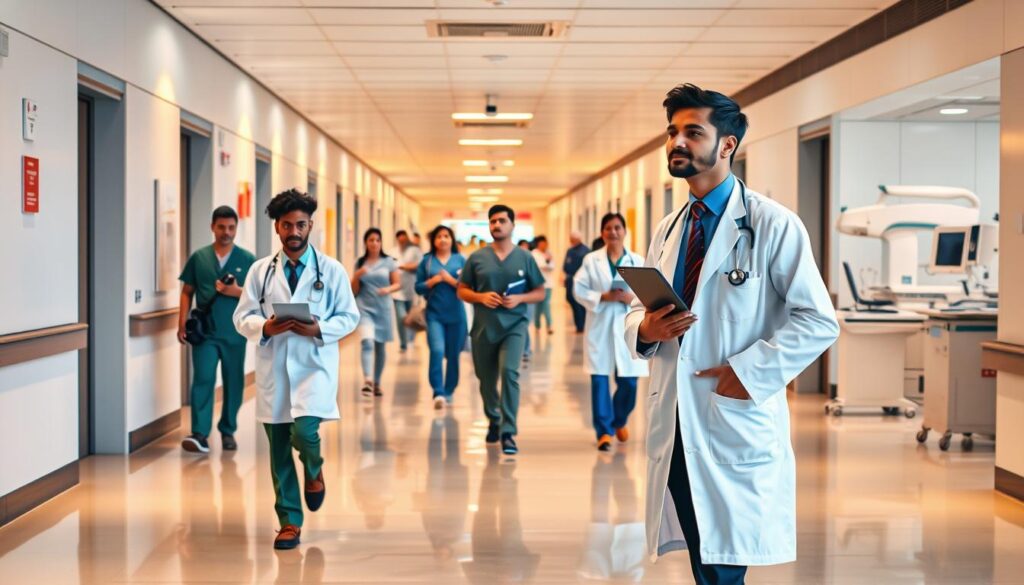Have you ever wondered how to bridge the gap between studying medicine abroad and practicing in India? For Indian students who complete their MBBS degree in Russia, this question is more than just a thought—it’s a crucial step in their medical journey.
Clinical training is an essential part of becoming a skilled doctor. It’s where theory meets practice, and students gain hands-on experience in real-world healthcare settings. For those who studied in Russian medical institutions, this phase is especially important to adapt to the Indian healthcare system.
This guide is designed to help Indian graduates navigate the process of securing internships in India. We’ll explore eligibility criteria, the application process, and the long-term benefits of this training. Whether you’re preparing for the FMGE or looking to specialize, this article is your roadmap to success.
Studying medicine in Russia offers a unique perspective, but transitioning to Indian practice requires careful planning. By understanding the differences in medical education systems, you can make the most of your training and build a rewarding career. For more insights on pursuing an MBBS degree in Russia, check out our detailed guide.
Understanding the Indian Hospital Internship Landscape
Navigating the Indian healthcare system can be a transformative experience for medical graduates. This system is a complex network of public and private institutions, each playing a vital role in shaping the future of healthcare professionals. For Indian students returning from abroad, it offers a platform to bridge theoretical knowledge with practical skills.
Overview of the Indian Healthcare System
The Indian healthcare system is divided into primary, secondary, and tertiary care levels. Primary care focuses on basic health services, while secondary and tertiary care handle specialized treatments. Leading universities and institutions collaborate with hospitals to provide high-quality education and clinical exposure.
This structure ensures that medical graduates gain hands-on experience in diverse settings. From rural clinics to urban hospitals, the system emphasizes patient care as a central element of training. This focus prepares students to address the unique healthcare challenges in India.
Benefits for Indian Medical Graduates
Indian medical graduates enjoy several advantages when transitioning into the healthcare system. Personalized training and mentorship are key benefits, helping students adapt to local practices. Universities and institutions provide structured education, ensuring a competitive edge in the field.
Networking opportunities are another significant advantage. Graduates can connect with experienced professionals, enhancing their career prospects. Additionally, the emphasis on patient care equips them with the skills needed to excel in diverse medical environments.
For those exploring affordable medical education options abroad, studying MBBS abroad can be a strategic choice. It offers global exposure while preparing students for the Indian healthcare system.
Hospital Internship After Russian MBBS: Key Considerations
Understanding the differences in medical training standards is crucial for graduates transitioning from global to local practices. For Indian students returning from Russia, this involves adapting to the Indian healthcare system while leveraging their international education. This section explores the key factors to consider when comparing global and local training standards.
Comparing Global and Local Training Standards
Medical training in Russia emphasizes a strong foundation in theoretical knowledge. Students gain a comprehensive understanding of medical sciences, often with a focus on research and innovation. In contrast, Indian training prioritizes hands-on experience in diverse clinical settings, preparing graduates for the country’s unique healthcare challenges.
Language and cultural differences also play a significant role. While Russian institutions often teach in English, local practices in India require proficiency in regional languages. This can impact communication with patients and colleagues, making it essential for graduates to adapt quickly.
Key Differences in Practical Experience
Practical training in Russia typically involves structured clinical rotations in well-equipped hospitals. However, the patient demographics and healthcare infrastructure differ significantly from India. Indian internships expose graduates to a wider range of cases, including tropical diseases and high patient volumes.
To bridge these gaps, graduates can focus on enhancing their hands-on skills during local training. Participating in workshops, seeking mentorship, and engaging in community health programs are effective strategies. These steps ensure a smoother transition and build confidence in clinical practice.
| Aspect | Russian Training | Indian Training |
|---|---|---|
| Focus | Theoretical knowledge and research | Hands-on clinical experience |
| Language | Primarily English | Regional languages |
| Patient Demographics | Diverse but limited to local population | Wide range, including tropical diseases |
| Infrastructure | Advanced facilities | Varied, from rural clinics to urban hospitals |
By understanding these differences, graduates can better prepare for the challenges of local practice. Adapting to the Indian healthcare system requires a blend of theoretical knowledge and hands-on training, ensuring a successful transition and a rewarding career.
Eligibility and Application Process for Indian Internships
Securing a medical training opportunity in India requires careful preparation and understanding of the eligibility criteria. For students and graduates returning from abroad, this process involves meeting specific academic and documentation requirements. This section outlines the essential steps to ensure a smooth application process.
Essential Documentation and Requirements
To apply for medical training programs in India, students must gather several key documents. These include academic transcripts, degree certificates, and proof of passing the Foreign Medical Graduate Examination (FMGE). Additionally, candidates need to provide passport copies, visa details, and a valid Eligibility Certificate (EC).
Document verification is a critical step. All papers must be notarized and authenticated to ensure their validity. This process helps avoid delays and ensures compliance with regulatory standards. For those exploring affordable education options abroad, applying for MBBS in Uzbekistan can be a strategic choice.
Step-by-Step Guide to the Application
The application process begins with registering for the FMGE, which is conducted twice a year. Candidates must score at least 150 out of 300 marks to qualify. After passing the exam, the next step is to prepare the application package, which includes the following:
- FMGE scorecard and certificate
- MBBS degree and transcripts
- Passport and visa copies
- Eligibility Certificate (EC)
Once the documents are ready, candidates can apply for provisional registration with the National Medical Commission (NMC) or the respective State Medical Council (SMC). This registration is mandatory for starting the one-year Compulsory Rotatory Medical Internship (CRMI).
| Document | Purpose |
|---|---|
| FMGE Scorecard | Proof of qualifying the exam |
| MBBS Degree | Verification of academic qualification |
| Passport Copy | Identity verification |
| Eligibility Certificate | Confirmation of eligibility for FMGE |
By following these steps, medical graduates can navigate the application process efficiently. Understanding the requirements and preparing thoroughly ensures a successful transition into the Indian healthcare system.
Advantages of Completing an Internship in India
Completing medical training in India offers unparalleled advantages for aspiring doctors. It provides a unique blend of practical learning and professional growth, essential for building a successful career in healthcare. Let’s explore the key benefits that make this experience invaluable.
Hands-On Experience and Clinical Exposure
One of the most significant benefits is the opportunity to gain hands-on experience in diverse clinical settings. This exposure allows graduates to handle a wide range of medical cases, from common illnesses to complex conditions. Such practical training builds confidence and sharpens skills, preparing them for real-world challenges.
Additionally, working in varied environments, from rural clinics to urban centers, offers a comprehensive understanding of India’s healthcare system. This diversity ensures that graduates are well-equipped to address the unique needs of different patient populations.
Networking and Career Enhancement Opportunities
Another advantage is the chance to network with leading doctors and specialists. Building connections with experienced professionals can open doors to mentorship, collaborations, and career advancement. These relationships often play a crucial role in shaping a successful medical career.
Moreover, personalized attention during training helps refine patient care techniques. Graduates learn to adapt to local practices, ensuring they provide high-quality care tailored to individual needs. This focus on patient-centered care is a cornerstone of medical practice in India.
- Real-world clinical experience is essential for every medical professional.
- Hands-on training in diverse settings builds confidence and expertise.
- Exposure to varied medical cases broadens clinical knowledge.
- Networking with experts enhances career prospects.
- Personalized training refines patient care skills.
These advantages not only prepare graduates for immediate challenges but also lay the foundation for long-term success in the medical field. By leveraging these opportunities, aspiring doctors can achieve their career goals and make a meaningful impact in healthcare.
Preparing for Transition: From Russian Medical Training to Indian Practice
Transitioning from a global medical education to local practice involves unique challenges and opportunities. For graduates returning to India, this shift requires adapting theoretical knowledge to practical scenarios and aligning with local medical norms. Let’s explore how to bridge this gap effectively.
Bridging Theoretical Knowledge with Practical Skills
Medical training in Russia emphasizes a strong theoretical foundation. However, Indian practice demands hands-on expertise in diverse clinical settings. To bridge this gap, graduates should focus on enhancing their practical skills through workshops, simulations, and real-world case studies.
Continuous learning is essential. Engaging in online courses or attending seminars can help graduates stay updated with the latest advancements in the medical field. Additionally, seeking mentorship from experienced professionals can provide valuable insights into local practices.
Adapting to Indian Medical Norms and Practices
Adapting to a new clinical environment involves understanding local protocols and patient expectations. Language barriers can be a significant challenge, especially when communicating with patients in regional languages. Graduates should consider language classes or practice sessions to improve fluency.
Professional judgment plays a crucial role in this transition. Graduates must learn to apply their knowledge in real-time, adapting to the unique demands of the Indian healthcare system. Leveraging resources like Perm State Medical University alumni networks can also ease the adaptation process.
| Aspect | Russian Training | Indian Practice |
|---|---|---|
| Focus | Theoretical knowledge | Hands-on experience |
| Language | Primarily English | Regional languages |
| Patient Interaction | Structured rotations | High patient volume |
| Clinical Protocols | Standardized | Localized |
By focusing on skill development and continuous learning, graduates can successfully transition into the Indian medical field. Embracing these challenges as opportunities for growth ensures a rewarding career in healthcare.
Career Development and Future Opportunities in Indian Healthcare
Building a successful medical career in India starts with strategic planning and leveraging every opportunity. The initial clinical exposure gained during training lays the foundation for long-term growth. By focusing on networking, specialization, and continuous learning, graduates can secure a rewarding future in healthcare.

Expanding Your Professional Network
Networking is a powerful tool for career advancement. Connecting with experienced professionals during training can open doors to mentorship, collaborations, and job placements. Many graduates find that these relationships play a crucial role in shaping their careers.
Attending medical conferences, joining professional associations, and participating in workshops are effective ways to expand your network. These activities not only enhance your knowledge but also increase your visibility in the medical community.
Pathways to Specialization and Further Training
Specialization is a key step in advancing your medical career. After completing your initial training, you can pursue postgraduate studies in fields like cardiology, neurology, or surgery. These programs provide in-depth knowledge and hands-on experience in your chosen area.
Many institutions offer fellowships and certifications to help you gain expertise. For those exploring alternative pathways, studying MBBS without NEET can be a strategic choice to save time and access quality education.
Long-Term Career Growth and Job Security
A well-planned career ensures long-term growth and job security. By continuously updating your skills and staying informed about industry trends, you can maintain a competitive edge. Specialized training and certifications further enhance your employability.
Graduates who focus on patient-centered care and ethical practices often find greater success. These qualities are highly valued in the healthcare sector and contribute to a fulfilling career.
| Career Pathway | Key Benefits |
|---|---|
| General Practice | Broad exposure to diverse medical cases |
| Specialization | In-depth expertise in a specific field |
| Research and Academia | Opportunities to contribute to medical advancements |
| Public Health | Focus on community health and policy development |
By focusing on these pathways, you can build a thriving medical career in India. Strategic planning and continuous learning are essential for achieving your goals and making a meaningful impact in healthcare.
Conclusion
Transitioning to a new healthcare environment can be a pivotal step in your medical career. This guide has highlighted the importance of gaining hands-on practice in diverse clinical settings, which is essential for building confidence and expertise. Adapting to a new environment allows you to focus on patient care and develop skills tailored to various medical challenges.
We’ve outlined the application process and eligibility requirements to help you navigate this transition smoothly. By leveraging the insights shared, you can enhance your practical experience and build a strong professional network. This foundation is crucial for long-term success in the healthcare field.
Specializing in your chosen area further strengthens your career prospects. Whether you’re exploring opportunities in India or considering alternatives like pursuing an MBBS in China, careful preparation and continuous learning are key. Embrace this journey as an opportunity to grow and make a meaningful impact in the medical field.




